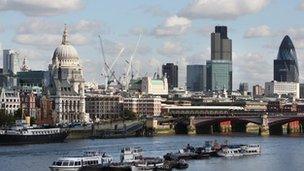Intel to use London as a smart city lab
- Published

Chip maker Intel has set up a laboratory in London to test the technologies that could power the cities of the future.
The Collaborative Research Institute for Sustainable Connected Cities was unveiled at 10 Downing Street.
Intel is partnering with Imperial College and University College London.
The aim of the institute will be to find real-life applications for technology to enhance city life.
Initially a dozen researchers will work at the institute.
It will aim to solve problems related to the environment, as well as the social and economic issues faced by growing cities.
"In 2050, most of the nine billion people in the world will live in cities," said Intel's chief technology officer Justin Rattner.
Increased urbanisation means that cities will have to find smart solutions to ensure they run smoothly and have minimal impact on the environment.
As London is the world's fifth largest city, with a hugely diverse cultural population, it makes the perfect testbed, said Mr Rattner.
"It is a microcosm of the whole planet, what better experimental platform?" he asked.
Launching the centre, he joked: "For all the Londoners out there, we're about to turn your fair city into a laboratory but don't be frightened, we know what we are doing."
Tech hub
The work undertaken at the lab would be citizen-led, Mr Rattner told the BBC, and was likely to include crowdsourcing data.
Anthropologists with work alongside computer scientists to make sure that the social needs of the population were taken into account, he said.
Other projects will include a network of sensors to monitor air quality, traffic flow, water supply and other parameters.
One of the most important tasks for the researchers will be extracting meaning from the huge amounts of data created by the project.
The centre's first study will be the summer Olympics.
"Poring over the data from such an event to see what systems worked and which didn't - that is a great experiment in the the making," said Mr Rattner.
Chancellor George Osborne welcomed the lab as another step towards making the UK the tech hub of Europe.
"We are determined to make the UK the best place to do business in the world and a great place for technology companies to invest and build new business. It is encouraging to see major tech partners like Intel investing in this country," he said.
The new institute will form part of Intel Labs. There are 40 such labs across Europe, all investigating different tech-related issues.
- Published30 September 2011
- Published4 May 2012